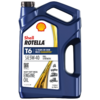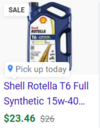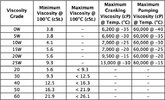Sidekick
Save Ukraine Stop War!
Not relevant for full synthetic oil as I learned tonight, thank you for mentioning itThe 5w40 versions always break down in grade faster than the 15w40 versions in the UOA’s I’ve had come back.

In UOA, the Rotella T6 5W-40 match the T6 15W-40 for grade retention (Shell labs).
The HTHS (High Temperature High Shear) looks to be the Key, both 5W-40 and 15W-40 meet or exceed the same HTHS spec (Shell labs & oildepot.ca)






